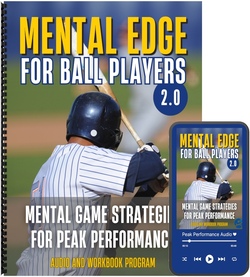How Do You Simplify the Game of Baseball?
How would you characterize your approach to baseball games?
Do you complicate the game by trying to do too much at the plate, on the mound, or in the field?
Many players believe the best approach to increase production is to make it happen. Instead of trusting their preparation, training, and abilities, they attempt to force production.
What does it mean to force production or try to do too much? Simply stated, “trying to do too much” means “playing outside of your ‘normal’ game.
“Trying to do too much” can take several forms:
- In pressure situations, some players try to be the hero of the moment. Rather than sticking to their approach at the plate, they swing for the fences. This approach often throws off their timing and causes them to lunge for pitches outside of the strike zone.
- Some players feel the need to significantly up their game in the playoffs. A pitcher whose strengths are location, and accuracy may try to increase his velocity, feeling he needs to set the tone for the series.
Instead of competing from his strengths, he attempts to throw the ball harder and overpower hitters, which results in a lack of control.
- Hitters in a slump may feel they need to make something happen, instead of being patient at the plate. Trying to force a hit usually leads to pressing and indecision in the batter’s box.
Trying to do too much complicates your approach to the game and is counterproductive. The most effective strategy for increasing production is to simplify your approach.
Simplicity in baseball means narrowing focus to what truly matters in the moment…
Instead of juggling a multitude of thoughts about technique adjustments, expectations, scoreboards, the need to be perfect, or “what if” scenarios, you should simplify your approach by narrowing your focus on a single target, one swing cue, or the ball itself.
When your mind is not overloaded, you achieve mental clarity, which reduces anxiety and sharpens execution.
As the 2025 MLB regular season winds down, the Cleveland Guardians remain in the playoff hunt.
With a little more than 20 games left in the season, the Guardians won eight straight and 13 of their last 14 to move within striking distance of earning a wildcard spot and potentially winning the division. A big part of Cleveland’s late-season surge has been catcher Bo Naylor.
During Cleveland’s streak, Naylor, who was batting .188, hit 10-for-26 (.385) with 11 RBIs. When asked about his recent hitting success, Naylor attributed it to a simplified mental approach that has removed some of the mental clutter and distractions in the batter’s box.
NAYLOR: “Simplicity — just locking in on my routine, making sure that I’m preparing the right way, and just going out there with a free mind, trusting in the work that I did beforehand. Going out there and just trying to execute the plan that I have or whoever’s out there on the mound.”
A simplified mental approach doesn’t mean ignoring strategy or preparation; instead, it’s about trusting them.
When you simplify your approach, you focus on competing from your strengths. You eliminate thought distractions and perform on autopilot.
A simplified mental approach clears your mind of clutter, fosters high confidence, builds trust in your game, and gives you the freedom to perform at your peak.
When it comes down to production, less can really be more.
3 Strategies to Simplify Your Approach
1. Stick to a Routine
Routines create consistency and reduce overthinking. Before each pitch, use a short pre-pitch routine to reset your mind and body. Take a breath, visualize success, and remind yourself of your plan. This simple sequence helps you stay grounded and focused on execution instead of results. When you follow the same process every time, you bring your attention to the present and build trust in your preparation.
2. Focus on One Cue
Your mind performs best when focused on one simple thought. Pick a cue that fits your role, such as “see the ball,” “smooth,” or “finish.” The goal is to eliminate extra mental noise that causes hesitation or tension. When distractions appear, use your cue to refocus. Repeat it with intention until your attention locks in on the task. This habit keeps your mind quiet and your performance automatic.
3. Trust Your Work
Confidence comes from preparation. Remind yourself that every rep, practice, and drill has built the foundation for your success. Overthinking or forcing results only adds pressure. Instead, tell yourself, “I’m ready,” and let your instincts take over. Trusting your work allows you to play freely and compete from your strengths. When you rely on what you’ve trained, your performance becomes fluid and consistent.
FAQ: Simplify Your Game
1. What does it mean to simplify your game?
Simplifying your game means focusing only on what matters in the moment. You let go of overthinking, stop trying to do too much, and trust your preparation. This helps you play with clarity and confidence.
2. Why do players overcomplicate the game?
Players often press when they feel pressure to perform. They try to force hits, throw harder, or make something happen instead of trusting their natural game. This creates tension and inconsistency.
3. How does a routine help simplify performance?
A routine gives structure and consistency before each pitch or play. It clears your mind, brings you back to the present, and locks your focus on execution instead of results.
4. What’s an example of a focus cue?
A focus cue is a short phrase or reminder that centers your attention, such as “see the ball,” “smooth swing,” or “finish.” The cue keeps your mind quiet and your actions automatic.
5. How do I learn to trust my work?
Trust comes from preparation. When you’ve trained with purpose and repetition, you can rely on your skills under pressure. Remind yourself that you’ve earned the right to compete freely.
6. Can simplifying my approach really improve performance?
Yes. A simple mental approach reduces tension, sharpens focus, and helps you perform on instinct. When your mind is clear, your body can do what it’s trained to do.
7. How can mental training help me simplify my game?
Mental training teaches you how to manage distractions, use routines, and focus your attention. It helps you build confidence, trust your preparation, and play with a calm, focused mindset.
Related Sports Psychology Articles
- Mindset When You Approach the Plate
- How to Stay Focused During Games
- What is the Trust the Process Mindset?
*Subscribe to The Sports Psychology Podcast on iTunes
*Subscribe to The Sports Psychology Podcast on Spotify
The Mental Edge for Ball Players (Digital Download)
“The Mental Edge for Ball Players” audio and workbook program teaches you to get a competitive edge in baseball and softball by overcoming a lack of focus, low self-confidence and other mental game obstacles. Learn practical mental strategies to improve your performance in competition.



